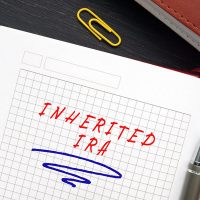Do You Have To Withdraw The Money From A Retirement Account You Inherited?

Through proactive estate planning, a person can leave the remainder of their retirement accounts to their heirs. What happens when a retirement account is inherited? The short answer is that the IRS has specific rules and regulations in place that require timely withdrawals. At Fisher Law LLC, we have extensive estate tax planning experience. Here, our Norwood estate planning attorney explains the key things to know about inherited retirement accounts.
IRS Regulations: Inherited Retirement Account
Tax advantaged retirement accounts are complicated. The Internal Revenue Service (IRS) explains that “retirement plan and IRA accounts after the death of the account owner are subject to required minimum distribution (RMD) rules.” These rules have big implications for the person who inherits an account. Here is an overview of your options if you inherit an IRA or other type of similar retirement account:
- Disclaim the Inheritance (Relatively Rare): You are not required by law to accept an IRA or other retirement account if you are named the beneficiary. While doing so is relatively rare, a person can disclaim If they opt to do so, the retirement plan will pass on to the next beneficiary in line. It could be an alternative beneficiary as named in the account.
- Roll the Funds Into Your Own IRA (Spouse-Only): Spouses have an additional option that other beneficiaries do not have access to. Specifically, they may be eligible to roll the inherited funds into their own IRA. Doing so allows the assets to continue growing tax- deferred—or tax-free in the case of a Roth IRA. The rollover also means the funds will be subject to the rules that apply to your own IRA, including the age requirements for required minimum distributions (RMDs) and early withdrawal penalties.
- Take a Lump Sum Withdrawal: You are never required to leave funds in an inherited IRA or other retirement plan. Opting for a lump-sum withdrawal means you take all the funds out of the IRA at This option provides immediate access to the cash but can come with significant tax implications, as the withdrawn amount adds to your taxable income for the year. For this reason, many people avoid the lump sum distribution.
- Keep Funds in and Take Required Minimum Distributions (RMDs): Finally, you can keep funds within the inherited IRA and opt to take only the RMDs—which is the minimum distribution amount required by Under recently reformed regulations, most people are required to take all distributions from the account within 10 years of the date that they inherited it.
Contact Our Norwood, MA Estate Planning Lawyer for a Confidential Consultation
At Fisher Law LLC, our Massachusetts estate planning attorneys are devoted to providing client-centered legal services. If you have any questions about inherited retirement accounts we can help. Contact our estate planning firm today for a confidential case review. Our firm provides estate planning services in Norwood and throughout all of the Greater Boston area.
